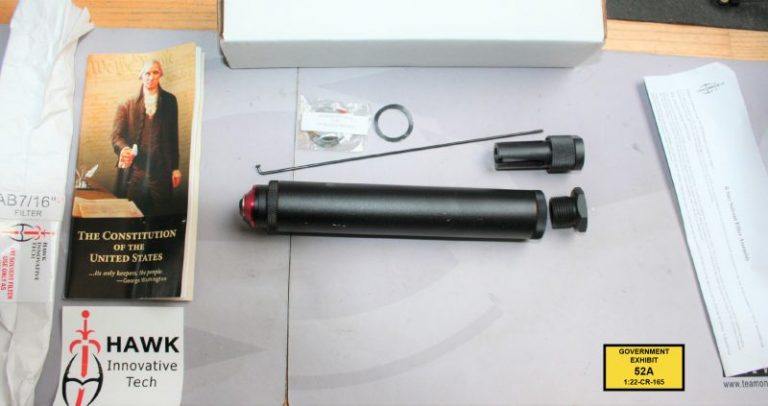A Navy reservist charged in connection with the Jan. 6 riot at the U.S. Capitol was convicted by a jury Wednesday of possessing three unregistered firearms silencers in a separate case.
Hatchet M. Speed, a petty reserve officer in the Navy with a top-secret security clearance, faces up to 30 years in prison when he is sentenced April 13 in federal court in Alexandria, Va., but his term is likely to be shorter because he has no prior criminal record. Courtney S. Dixon, one of his public defenders, said Speed plans to appeal his conviction.
Speed was investigated by the FBI for more than a year after U.S. authorities say he breached the Capitol during the Jan. 6, 2021, attack with the Proud Boys extremist group. He has pleaded not guilty to charges stemming from the attack. That trial is set to begin next month.
Federal prosecutors in the Eastern District of Virginia separately pursued charges that Speed owned three unregistered silencers, which the FBI seized in June from a storage unit Speed had leased in Alexandria.
Speed until recently worked with a U.S. defense and intelligence cyberoperations contractor based in Vienna, Va., but resigned as he delved deeper into fringe ideologies, authorities said. An undercover FBI employee sent to befriend Speed said he spoke about using violence to further “anti-government and anti-Semitic ideologies” and remarked that many “enemies” were clustered in the Washington area, according to court documents.
The trial hinged on whether the items the FBI seized were indeed silencers. Speed said he bought the devices online from a company called Hawk Innovative Tech, based in Georgia, that advertised and sold them as gun-cleaning accessories, or “solvent traps.”
“These devices were not solvent traps,” Assistant U.S. Attorney Thomas W. Traxler told the jury. “These devices were firearm silencers masquerading as solvent traps — and the defendant knew that.”
A public defender for Speed, Brooke S. Rupert, said the devices were not designed to be silencers, and that Speed never made the modifications required to convert them into such devices.
“These solvent traps, which were labeled as solvent traps and marketed as solvent traps, were found untouched and unmodified 15 months” after Speed purchased them, Rupert told the jury.
Speed was first tried in December, but that jury could not reach a unanimous verdict, and U.S. District Judge Michael S. Nachmanoff declared a mistrial. Prosecutors immediately sought a retrial.
An official from the Bureau of Alcohol, Firearms, Tobacco and Explosives (ATF), Eve Eisenbise, testified that she tested one of the devices seized from Speed and found that it was one of the most effective silencers she had seen, reducing the firing sound of a .22-caliber Ruger pistol by 23.58 decibels. Eisenbise testified that she first had to drill a hole through one of the device’s end-caps and remove several metallic strainers inside the tube before it could function as a silencer.
Speed’s public defenders emphasized that Speed had not made those changes. But prosecutors played clips of Speed telling the undercover FBI agent that he planned to use the devices after kidnapping people and that the devices would “stay quiet” after firing one shot.
Under federal law, any device or “combination of parts” intended to reduce the sound of gunfire must be registered with federal officials as if it were a firearm, even if it is not found in a functional state. U.S. officials have seized the website of Hawk Innovative Tech and its owners’ financial assets, claiming in a legal filing that the company was engaging in fraud.
The company’s attorney previously told The Washington Post that no charges have been filed as part of that investigation and that Hawk Innovative Tech refused to sell to people who said they wanted to purchase silencers.

